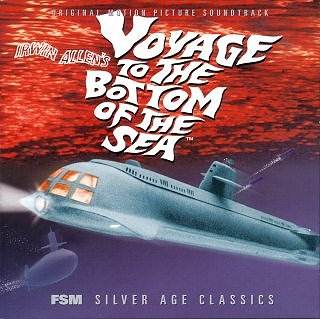Paul SAWTELL and Bert
SHEFTER Voyage to the Bottom of the Sea
 OST
OST  FILM
SCORE MONTHLY Vol. 4 No. 10 [55:53]
FILM
SCORE MONTHLY Vol. 4 No. 10 [55:53]
[Available through the magazine, Film Score Monthly, or its website(www.filmscoremonthly.com)
for $19:95 plus shipping: Film Score Monthly, 8503 Washington
Boulevard, Culver City CA 90232, ph: 310-253-9595 or toll-free
1-888-345-6335 fax:310-253-9588; Lukas@filmscoremonthly.com]

20th Century Fox have always been
at the forefront of big budget science fiction, and Irwin Allen's
1961 production could be said to be ahead of the pack in elevating
the cinematic version of the genre from the clutches of 1950's
B movies. It paved the way for Fox's Fantastic Voyage (1966)
and Planet of the Apes (1968), and led the way in big budget
Hollywood SF valuing special effects over sense. Voyage to
the Bottom of the Sea is one of the most idiotic A pictures
films ever made - the Van Allen belt has "caught fire" and the
way to put it out is with nuclear explosions! - yet was successful
enough to spin-off a four season TV series which established the
format for Star Trek's interplanetary adventures.
Of the two composers responsible for the score,
Paul Sawtell and Bert Shefter, Sawtell also wrote the theme and
scored the first five episodes of the TV incarnation of Voyage
to the Bottom of the Sea. This album however is entirely devoted
to the cinema film. All the cues were jointly attributed to the
two composers, so it is a matter of speculation who wrote what.
Sawtell worked on over 360 films in total, mostly B movies, including
vast numbers of westerns. Shefter's career was similar, but no
where near as prolific, and his scores were almost always written
in collaboration with Sawtell. Working on vast numbers of pictures
and TV shows, they are among the many uncelebrated but highly
skilled musical craftsmen of Hollywood.
The album opens with the main title song, a typical
MOR pop ballad of the era sung with some charm by pop pip-up Frankie
Avalon. The cue fades into "The Super Sub", a typical piece of
nautical bombast incorporating various patriotic themes. "Dive"
briefly links the melody of the title theme to descriptive underwater
music in a tradition harking back to Bernard Herrmann's groundbreaking
Beneath the 12-Mile Reef (1953) (another Fox score recently
released by Film Score Monthly http://www.musicweb.uk.net/film/2001/Apr01/Herrmann12.html)
The drama really starts with track 4, the six
minutes of "Ice Block Collision/The Red Sea/Survivor". Tense,
muscular chromatic writing, unresolved strings and surging harps
delivers a whirlwind of action and suspense. The stereo sound
is exceptionally good for the time and fans of Herrmann's Ray
Harryhausen fantasy adventure scores will feel right at home.
Indeed, the brief might well have been to deliver cut-price imitation
Herrmann. It is a sensibility maintained throughout, with several
extended sections providing considerable dramatic intensity. See
for example the eight minutes of "Brave Volunteers/Cable Search/Dangerous
Grounds/The Squid Attacks", the following seven minute "Alvarez's
Resignation/Minefield Explosions/All Back - Dead Slow" or the
climactic "Fatal Dose/Alvarez Acts/Successful Mission".
Packed with incident, filled with the urgency
and tightly written action, this is both typical of screen SF
of the 50's into the early 60's and whether deliberately or not,
a homage to the underwater/fantasy scoring of Bernard Herrmann.
Besides Beneath the 12-Mile Reef there are echoes of Herrmann's
Journey to the Centre of the Earth (a Fox feature from
1959), Mysterious Island (1961) and On Dangerous Ground
(1951). Whether or not this counts for being a classic in
its own right is debatable, the score being one of many following
in a well established tradition; the difference between the great
film composers who define their own sound and the craftsmen who
follow and make it generic.
It is doubtful whether this score would have
been released had it not come from a particularly successful film,
particularly one in a genre, science fiction, especially popular
with soundtrack collectors. Well crafted as it is, the score remains
a solid piece of genre craftsmanship. It is perfectly fine for
what it is, but to apply the term "classic" is to devalue the
word.
As ever with Film Score Monthly releases, the
album is exceptionally well presented. After the score proper
there are three bonus cues: a temporary and a demo main title,
and one short damaged cue, "Nervous Hysteria". The booklet is
first-rate, beautifully printed with colour stills, essays on
both the film and the score, and a cue by cue annotation of the
soundtrack. This is an excellent presentation of a good, characterful
score. It's just a shame the character belongs to another, much
more distinguished composer.
Gary S. Dalkin

